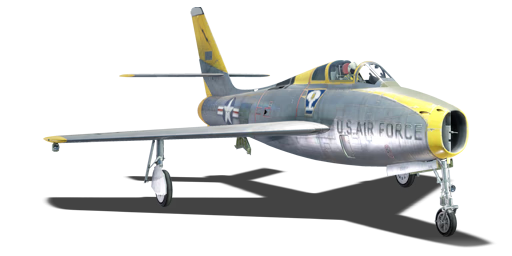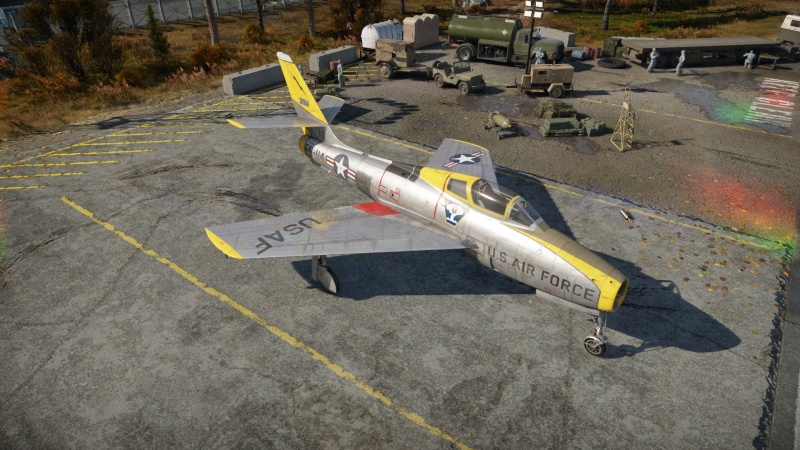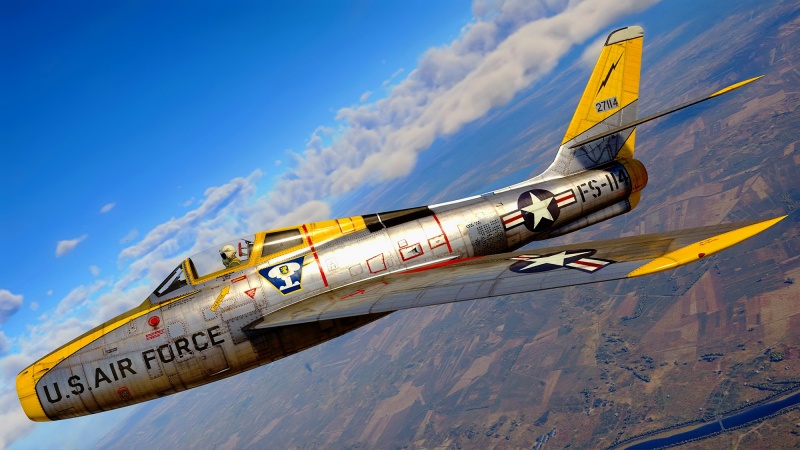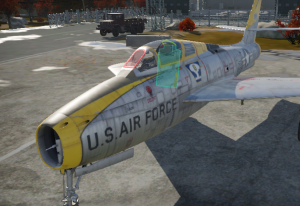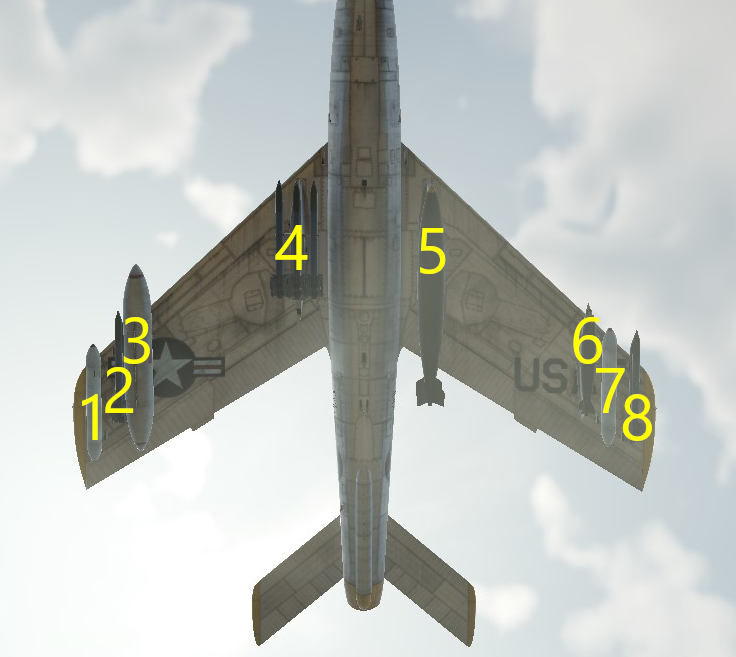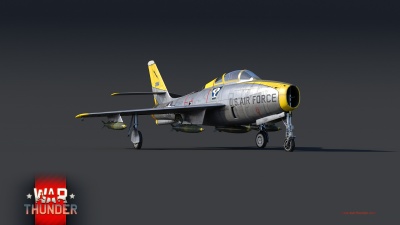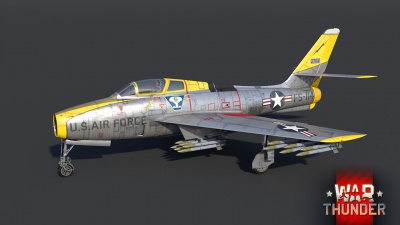Difference between revisions of "F-84F"
(Edits) |
m (Removed a point about the plane "gaining a fair bit of speed in a dive", how that *ever* got written in the first place I'm shocked by) (Tag: Visual edit) |
||
| (40 intermediate revisions by 15 users not shown) | |||
| Line 1: | Line 1: | ||
| + | {{About | ||
| + | |about=American strike aircraft '''{{PAGENAME}}''' | ||
| + | |usage=other versions | ||
| + | |link=F-84 (Family) | ||
| + | }} | ||
{{Specs-Card | {{Specs-Card | ||
|code=f-84f | |code=f-84f | ||
| − | |images={{Specs-Card-Image|GarageImage_{{PAGENAME}}.jpg}} | + | |images={{Specs-Card-Image|GarageImage_{{PAGENAME}}.jpg|ArtImage_{{PAGENAME}}.jpg}} |
}} | }} | ||
== Description == | == Description == | ||
<!-- ''In the description, the first part should be about the history of and the creation and combat usage of the aircraft, as well as its key features. In the second part, tell the reader about the aircraft in the game. Insert a screenshot of the vehicle, so that if the novice player does not remember the vehicle by name, he will immediately understand what kind of vehicle the article is talking about.'' --> | <!-- ''In the description, the first part should be about the history of and the creation and combat usage of the aircraft, as well as its key features. In the second part, tell the reader about the aircraft in the game. Insert a screenshot of the vehicle, so that if the novice player does not remember the vehicle by name, he will immediately understand what kind of vehicle the article is talking about.'' --> | ||
| − | + | In 1949, a plan to increase the performance of the straight-wing F-84 Thunderjet was developed. A swept-wing version was designed to increase the speed and range. At low-altitude, the speed was much better than the previous F-84E. However, overall performance was still lacklustre so the USAF wanted a better engine to improve the climb and high-altitude performance. Armstrong-Siddeley Sapphire engines were selected and eventually Curtiss-Wright would build them under license as the J65. After constant setbacks during production, deliveries finally rolled in until 1957 when over 2,000 F-84F Thunderstreaks were built. Pilots enjoyed the Thunderstreak as it was robust and flew well in turbulent conditions. However, it required a high landing speed and certain manoeuvres were far too dangerous to perform. They were gradually replaced by the F-100 Super Sabre until the [[wikipedia:Berlin_Crisis_of_1961|Berlin Crisis]] reactivated many Thunderstreaks. They would eventually find their way into the Air National Guard until the early 1970s when they were finally retired in US service. | |
| + | |||
| + | Introduced in [[Update "Hot Tracks"]], the F-84F is a decent aircraft with some flaws. Although the Thunderstreak is relatively fast, it struggles to reach that speed in an acceptable amount of time. Carrying bombs also greatly diminishes the acceleration so players should carry a light fuel load to offset the weight. The six nose-mounted 12.7 mm machine guns are sufficient for ground attack, but attacking enemy aircraft can be frustrating due to the lack of sufficient stopping power. Overall, the F-84F Thunderstreak is a fairly decent strike aircraft but performance limitations and its battle rating hinder its effectiveness. | ||
== General info == | == General info == | ||
| Line 12: | Line 19: | ||
{{Specs-Avia-Flight}} | {{Specs-Avia-Flight}} | ||
<!-- ''Describe how the aircraft behaves in the air. Speed, manoeuvrability, acceleration and allowable loads - these are the most important characteristics of the vehicle.'' --> | <!-- ''Describe how the aircraft behaves in the air. Speed, manoeuvrability, acceleration and allowable loads - these are the most important characteristics of the vehicle.'' --> | ||
| − | |||
{| class="wikitable" style="text-align:center" width="70%" | {| class="wikitable" style="text-align:center" width="70%" | ||
! rowspan="2" | Characteristics | ! rowspan="2" | Characteristics | ||
| − | ! colspan="2" | Max | + | ! colspan="2" | Max speed<br>(km/h at 0 m - sea level) |
! rowspan="2" | Max altitude<br>(metres) | ! rowspan="2" | Max altitude<br>(metres) | ||
! colspan="2" | Turn time<br>(seconds) | ! colspan="2" | Turn time<br>(seconds) | ||
| Line 25: | Line 31: | ||
|- | |- | ||
! Stock | ! Stock | ||
| − | | 1, | + | | 1,090 || 1,067 || rowspan="2" | {{Specs|ceiling}} || 29.7 || 30.9 || 30.7 || 28.8 || rowspan="2" | 2,000 |
|- | |- | ||
! Upgraded | ! Upgraded | ||
| − | | | + | | 1,111 || 1,102 || 26.5 || 28.0 || 45.9 || 38.0 |
|- | |- | ||
|} | |} | ||
| Line 54: | Line 60: | ||
! Combat !! Take-off !! Landing !! + !! - | ! Combat !! Take-off !! Landing !! + !! - | ||
|- | |- | ||
| − | | {{Specs|destruction|body}} || {{Specs|destruction|gear}} || | + | | {{Specs|destruction|body}} || {{Specs|destruction|gear}} || 533 || 515 || 417 || ~11 || ~3 |
|- | |- | ||
|} | |} | ||
| Line 65: | Line 71: | ||
|- | |- | ||
| < 630 || < 600 || < 650 || N/A | | < 630 || < 600 || < 650 || N/A | ||
| + | |- | ||
| + | |} | ||
| + | |||
| + | ==== Engine performance ==== | ||
| + | {| class="wikitable" style="text-align:center" | ||
| + | |- | ||
| + | ! colspan="3" | Engine | ||
| + | ! colspan="4" | Aircraft mass | ||
| + | |- | ||
| + | ! colspan="2" | Engine name || Number | ||
| + | ! colspan="2" | {{Annotation|Basic mass|Mass of the aircraft with pilot and engine oil, but no fuel or weapons load}} || colspan="2" | Wing loading (full fuel) | ||
| + | |- | ||
| + | | colspan="2" | Wright J65-W-7 || 1 | ||
| + | | colspan="2" | 6,667 kg || colspan="2" | 279 kg/m<sup>2</sup> | ||
| + | |- | ||
| + | ! colspan="3" | Engine characteristics | ||
| + | ! colspan="3" | Mass with fuel (no weapons load) || rowspan="2" | Max Takeoff<br>Weight | ||
| + | |- | ||
| + | ! Weight (each) || colspan="2" | Type | ||
| + | ! 8m fuel || 20m fuel || 29m fuel | ||
| + | |- | ||
| + | | 1,260 kg || colspan="2" | Axial-flow turbojet | ||
| + | | 7,177 kg || 7,838 kg || 8,368 kg || 8,935 kg | ||
| + | |- | ||
| + | ! colspan="3" | {{Annotation|Maximum engine thrust @ 0 m (RB/SB)|The maximum thrust produced by each engine, while mounted in the aircraft. NOTE: Thrust varies significantly depending on speed & altitude.}} | ||
| + | ! colspan="4" | Thrust to weight ratio @ 0 m (100%) | ||
| + | |- | ||
| + | ! Condition || 100% || WEP | ||
| + | ! 8m fuel || 20m fuel || 29m fuel || MTOW | ||
| + | |- | ||
| + | | ''Stationary'' || 3,470 kgf || N/A | ||
| + | | 0.48 || 0.44 || 0.41 || 0.39 | ||
| + | |- | ||
| + | | ''Optimal'' || 3,470 kgf<br>(0 km/h) || N/A | ||
| + | | 0.48 || 0.44 || 0.41 || 0.39 | ||
|- | |- | ||
|} | |} | ||
| Line 71: | Line 112: | ||
{{Specs-Avia-Armour}} | {{Specs-Avia-Armour}} | ||
<!-- ''Examine the survivability of the aircraft. Note how vulnerable the structure is and how secure the pilot is, whether the fuel tanks are armoured, etc. Describe the armour, if there is any, and also mention the vulnerability of other critical aircraft systems.'' --> | <!-- ''Examine the survivability of the aircraft. Note how vulnerable the structure is and how secure the pilot is, whether the fuel tanks are armoured, etc. Describe the armour, if there is any, and also mention the vulnerability of other critical aircraft systems.'' --> | ||
| − | + | The F-84F Thunderstreak has six fuel tank modules. Two are mounted within the fuselage of the aircraft meanwhile the rest are found in the wings. As usual, they are all self-sealing fuel tanks. The Thunderstreak also has two armour plates; one 8 mm steel plate that covers most of the pilot from the rear and a small 12.7 mm steel plate that covers the pilot's head from behind. In addition, the front cockpit glass is 38 mm bulletproof glass with a 61° construction angle. | |
| + | [[File:F-84F Armour layout.png|center|thumb|300x300px|Armour layout of the F-84F]] | ||
=== Modifications and economy === | === Modifications and economy === | ||
| Line 78: | Line 120: | ||
== Armaments == | == Armaments == | ||
{{Specs-Avia-Armaments}} | {{Specs-Avia-Armaments}} | ||
| + | {| class="wikitable" style="text-align:center" | ||
| + | |- | ||
| + | ! colspan="4" | [[Ballistic Computer]] | ||
| + | |- | ||
| + | ! CCIP (Guns) !! CCIP (Rockets) !! CCIP (Bombs) !! CCRP (Bombs) | ||
| + | |- | ||
| + | | {{Cross}} || {{Cross}} || {{Cross}} || {{Tick}} | ||
| + | |- | ||
| + | |} | ||
=== Offensive armament === | === Offensive armament === | ||
{{Specs-Avia-Offensive}} | {{Specs-Avia-Offensive}} | ||
| Line 91: | Line 142: | ||
{{Specs-Avia-Suspended}} | {{Specs-Avia-Suspended}} | ||
<!-- ''Describe the aircraft's suspended armament: additional cannons under the wings, bombs, rockets and torpedoes. This section is especially important for bombers and attackers. If there is no suspended weaponry remove this subsection.'' --> | <!-- ''Describe the aircraft's suspended armament: additional cannons under the wings, bombs, rockets and torpedoes. This section is especially important for bombers and attackers. If there is no suspended weaponry remove this subsection.'' --> | ||
| − | |||
| − | |||
The '''''{{PAGENAME}}''''' can be outfitted with the following ordnance: | The '''''{{PAGENAME}}''''' can be outfitted with the following ordnance: | ||
| + | |||
| + | {| class="wikitable" style="text-align:center" width="100%" | ||
| + | |- | ||
| + | ! !! width="5%" | 1 !! width="5%" | 2 !! width="5%" | 3 !! width="5%" | 4 !! width="5%" | 5 !! width="5%" | 6 !! width="5%" | 7 !! width="5%" | 8 | ||
| + | | rowspan="9" width="30%" | <div class="ttx-image">[[File:Hardpoints_{{PAGENAME}}.png]]</div> | ||
| + | |- | ||
| + | ! [[LDGP Mk 81 (250 lb)|250 lb LDGP Mk 81]] bombs | ||
| + | | || || 1 || 1 || 1 || 1 || || | ||
| + | |- | ||
| + | ! [[LDGP Mk 82 (500 lb)|500 lb LDGP Mk 82]] bombs | ||
| + | | || || 1 || 1 || 1 || 1 || || | ||
| + | |- | ||
| + | ! [[LDGP Mk 83 (1,000 lb)|1,000 lb LDGP Mk 83]] bombs | ||
| + | | || || 1 || 1 || 1 || 1 || || | ||
| + | |- | ||
| + | ! [[LDGP Mk 84 (2,000 lb)|2,000 lb LDGP Mk 84]] bombs | ||
| + | | || || 1 || 1 || 1 || 1 || || | ||
| + | |- | ||
| + | ! [[BLU-1 incendiary]] bombs | ||
| + | | || || 1 || 1 || 1 || 1 || || | ||
| + | |- | ||
| + | ! [[FFAR Mighty Mouse]] rockets | ||
| + | | 7 || 7 || 7 || || || 7 || 7 || 7 | ||
| + | |- | ||
| + | ! [[HVAR]] rockets | ||
| + | | 2 || 2 || 2 || 6 || 6 || 2 || 2 || 2 | ||
| + | |- | ||
| + | | colspan="9" | Maximum permissible loadout weight: 2,700 kg<br>Maximum permissible wing load: 1,350 kg<br>Maximum permissible weight imbalance: 700 kg | ||
| + | |- | ||
| + | |} | ||
| + | |||
| + | {{Navigation-Start|Default weapon presets}} | ||
| + | {{Navigation-First-Simple-Line}} | ||
* Without load | * Without load | ||
| − | |||
| − | |||
* 24 x HVAR rockets | * 24 x HVAR rockets | ||
* 42 x FFAR Mighty Mouse rockets | * 42 x FFAR Mighty Mouse rockets | ||
| Line 105: | Line 185: | ||
* 4 x 1,000 lb LDGP Mk 83 bombs (4,000 lb total) | * 4 x 1,000 lb LDGP Mk 83 bombs (4,000 lb total) | ||
* 2 x 2,000 lb LDGP Mk 84 bombs (4,000 lb total) | * 2 x 2,000 lb LDGP Mk 84 bombs (4,000 lb total) | ||
| + | * 4 x BLU-1 incendiary bombs | ||
| + | {{Navigation-End}} | ||
== Usage in battles == | == Usage in battles == | ||
<!-- ''Describe the tactics of playing in the aircraft, the features of using aircraft in a team and advice on tactics. Refrain from creating a "guide" - do not impose a single point of view, but instead, give the reader food for thought. Examine the most dangerous enemies and give recommendations on fighting them. If necessary, note the specifics of the game in different modes (AB, RB, SB).'' --> | <!-- ''Describe the tactics of playing in the aircraft, the features of using aircraft in a team and advice on tactics. Refrain from creating a "guide" - do not impose a single point of view, but instead, give the reader food for thought. Examine the most dangerous enemies and give recommendations on fighting them. If necessary, note the specifics of the game in different modes (AB, RB, SB).'' --> | ||
| − | + | The F-84F is capable of high speeds for its Battle Rating, but takes a very long time to get there due to slow acceleration. Thus, the pilot generally must first climb in order to reach speeds similar to those of its opponents. Due to diverse ordnance options, it is useful as a Close Air Support jet in mixed battles, or to destroy ground/naval targets and bases in Air Battles. It can be used as a boom-and-zoom fighter, perhaps after first dropping ordnance, as its powerful engine provides good energy retention. Air spawn in Realistic Air battles provides the somewhat necessary advantage for this. Its guns will be familiar from other F-84 and F-86 models, and are reasonably effective if aimed properly. However, the F-84F is not a turnfighter by any means and is a cumbersome aircraft, especially at slow speeds. | |
| + | |||
| + | === Radars === | ||
| + | <!--{{main|AN/APG-30}}--> | ||
| + | The F-84F is equipped with an AN/APG-30 rangefinding radar, located in the nose of the aircraft. | ||
| + | It will automatically detect other planes within the scanning area and display the range to the closest target. It is linked with a gyro gunsight and can help with aiming at close range. | ||
| + | |||
| + | {| class="wikitable" style="text-align:center" | ||
| + | ! colspan="4" | AN/APG-30 - Rangefinding radar | ||
| + | |- | ||
| + | ! {{Annotation|Maximum<br/>Tracking<br/>Range|The maximum range at which a target can be tracked}} | ||
| + | ! {{Annotation|Minimum<br/>Tracking<br/>Range|The range below which targets cannot be tracked by the radar}} | ||
| + | ! {{Annotation|Azimuth Tracking<br/>Angle|How far to each side the radar can track a target}} | ||
| + | ! {{Annotation|Elevation Tracking<br/>Angle|How far up and down the radar can track a target}} | ||
| + | |- | ||
| + | | 2,750 m || 300 m || ±9° || ±9° | ||
| + | |- | ||
| + | |} | ||
=== Pros and cons === | === Pros and cons === | ||
<!-- ''Summarise and briefly evaluate the vehicle in terms of its characteristics and combat effectiveness. Mark its pros and cons in the bulleted list. Try not to use more than 6 points for each of the characteristics. Avoid using categorical definitions such as "bad", "good" and the like - use substitutions with softer forms such as "inadequate" and "effective".'' --> | <!-- ''Summarise and briefly evaluate the vehicle in terms of its characteristics and combat effectiveness. Mark its pros and cons in the bulleted list. Try not to use more than 6 points for each of the characteristics. Avoid using categorical definitions such as "bad", "good" and the like - use substitutions with softer forms such as "inadequate" and "effective".'' --> | ||
| − | |||
'''Pros:''' | '''Pros:''' | ||
| − | * | + | |
| + | * 4 nose-mounted .50 cals plus 2 near the side of the airframe making accurate shots possible | ||
| + | * 42 FFAR rockets making it great for pillbox hunting in Air Battles | ||
| + | * A lot of variety of ordnance for ground attack | ||
| + | * All bombs can be dropped independently | ||
| + | * Sitting at rank V, it retains its airspawn in air realistic battles | ||
'''Cons:''' | '''Cons:''' | ||
| − | * | + | |
| + | * Turning is below average so don't expect to last long in a turnfight with any aircraft | ||
| + | * While turning, speed is bled a lot so maintain your speed or choose carefully on what turn you make | ||
| + | * Will commonly face air-to-air missiles, many of which it can have difficulty evading | ||
| + | * Most jets will catch up to it due to poor acceleration | ||
| + | * The .50 cal MGs are underpowered for its rank | ||
| + | * The FFAR rockets are placed at the wingtips, which results in lower accuracy | ||
== History == | == History == | ||
<!-- ''Describe the history of the creation and combat usage of the aircraft in more detail than in the introduction. If the historical reference turns out to be too long, take it to a separate article, taking a link to the article about the vehicle and adding a block "/History" (example: <nowiki>https://wiki.warthunder.com/(Vehicle-name)/History</nowiki>) and add a link to it here using the <code>main</code> template. Be sure to reference text and sources by using <code><nowiki><ref></ref></nowiki></code>, as well as adding them at the end of the article with <code><nowiki><references /></nowiki></code>. This section may also include the vehicle's dev blog entry (if applicable) and the in-game encyclopedia description (under <code><nowiki>=== In-game description ===</nowiki></code>, also if applicable).'' --> | <!-- ''Describe the history of the creation and combat usage of the aircraft in more detail than in the introduction. If the historical reference turns out to be too long, take it to a separate article, taking a link to the article about the vehicle and adding a block "/History" (example: <nowiki>https://wiki.warthunder.com/(Vehicle-name)/History</nowiki>) and add a link to it here using the <code>main</code> template. Be sure to reference text and sources by using <code><nowiki><ref></ref></nowiki></code>, as well as adding them at the end of the article with <code><nowiki><references /></nowiki></code>. This section may also include the vehicle's dev blog entry (if applicable) and the in-game encyclopedia description (under <code><nowiki>=== In-game description ===</nowiki></code>, also if applicable).'' --> | ||
=== [[wt:en/news/6990-development-f-84f-thunderstreak-en|Devblog]] === | === [[wt:en/news/6990-development-f-84f-thunderstreak-en|Devblog]] === | ||
| − | In the late | + | In the late 1940s, the manufacturer 'Republic' sought to improve the performance of the F-84 in order to bring it closer in line with the F-86 Sabre. As a result, it developed a new variant of the Thunderjet, designated F-84F. The new aircraft featured, among other changes, a new swept wing and a more powerful engine than its predecessor. Although Republic initially intended the new aircraft to be an extensive modernization of the base F-84, possessing a high degree of part compatibility with preceding variants, in the end, only less than 20% of the parts were interchangeable, resulting in the F-84F Thunderstreak becoming its own independent design. |
| − | Following its maiden flight in the early | + | Following its maiden flight in the early 1950s, the F-84F was ordered into production. However, the USAF focus on strategic bombers at the time resulted in some critical component manufacturing processes being prioritized for bomber production, ultimately leading to a staggered production start of the new F-84F. |
| − | The Thunderstreak officially entered service with the USAF in 1954, but was quickly phased out of active service due to engine issues before being reactivated in the early | + | The Thunderstreak officially entered service with the USAF in 1954, but was quickly phased out of active service due to engine issues before being reactivated in the early 1960s as tensions between the two superpowers began to rise again. Ultimately, the F-84F kept flying under American colors well into the early 1970s before finally being retired as newer aircraft replaced the Thunderstreak in active service. |
The F-84F was also widely exported to NATO members. Chiefly among them were Germany, France, Italy, Belgium, Greece, China, the Netherlands as well as others. In total, well over 2,100 F-84F Thunderstreaks were built, with the Greek Air Force being the last to retire their F-84Fs in 1991. | The F-84F was also widely exported to NATO members. Chiefly among them were Germany, France, Italy, Belgium, Greece, China, the Netherlands as well as others. In total, well over 2,100 F-84F Thunderstreaks were built, with the Greek Air Force being the last to retire their F-84Fs in 1991. | ||
| Line 133: | Line 242: | ||
== Media == | == Media == | ||
<!-- ''Excellent additions to the article would be video guides, screenshots from the game, and photos.'' --> | <!-- ''Excellent additions to the article would be video guides, screenshots from the game, and photos.'' --> | ||
| + | |||
| + | ;Skins | ||
| + | |||
| + | * [https://live.warthunder.com/feed/camouflages/?vehicle=f-84f Skins and camouflages for the {{PAGENAME}} from live.warthunder.com.] | ||
| + | |||
| + | ;Videos | ||
<gallery mode="packed" caption="F-84F Thunderstreak Devblog Images" heights="150"> | <gallery mode="packed" caption="F-84F Thunderstreak Devblog Images" heights="150"> | ||
File:F-84F Thunderstreak WTWallpaper 001.jpg| | File:F-84F Thunderstreak WTWallpaper 001.jpg| | ||
| Line 143: | Line 258: | ||
* ''links to approximate analogues of other nations and research trees.'' --> | * ''links to approximate analogues of other nations and research trees.'' --> | ||
''Links to the articles on the War Thunder Wiki that you think will be useful for the reader, for example:'' | ''Links to the articles on the War Thunder Wiki that you think will be useful for the reader, for example:'' | ||
| + | |||
* ''reference to the series of the aircraft;'' | * ''reference to the series of the aircraft;'' | ||
* ''links to approximate analogues of other nations and research trees.'' | * ''links to approximate analogues of other nations and research trees.'' | ||
| Line 152: | Line 268: | ||
* [[wt:en/news/6990-development-f-84f-thunderstreak-en|[Devblog] F-84F Thunderstreak]] | * [[wt:en/news/6990-development-f-84f-thunderstreak-en|[Devblog] F-84F Thunderstreak]] | ||
| + | * [https://forum.warthunder.com/index.php?/topic/510660-f-84f-thunderstreak/ Official data sheet - more details about the performance] | ||
| + | {{AirManufacturer Republic}} | ||
{{USA jet aircraft}} | {{USA jet aircraft}} | ||
Latest revision as of 05:51, 11 November 2024
| This page is about the American strike aircraft F-84F. For other versions, see F-84 (Family). |
Contents
Description
In 1949, a plan to increase the performance of the straight-wing F-84 Thunderjet was developed. A swept-wing version was designed to increase the speed and range. At low-altitude, the speed was much better than the previous F-84E. However, overall performance was still lacklustre so the USAF wanted a better engine to improve the climb and high-altitude performance. Armstrong-Siddeley Sapphire engines were selected and eventually Curtiss-Wright would build them under license as the J65. After constant setbacks during production, deliveries finally rolled in until 1957 when over 2,000 F-84F Thunderstreaks were built. Pilots enjoyed the Thunderstreak as it was robust and flew well in turbulent conditions. However, it required a high landing speed and certain manoeuvres were far too dangerous to perform. They were gradually replaced by the F-100 Super Sabre until the Berlin Crisis reactivated many Thunderstreaks. They would eventually find their way into the Air National Guard until the early 1970s when they were finally retired in US service.
Introduced in Update "Hot Tracks", the F-84F is a decent aircraft with some flaws. Although the Thunderstreak is relatively fast, it struggles to reach that speed in an acceptable amount of time. Carrying bombs also greatly diminishes the acceleration so players should carry a light fuel load to offset the weight. The six nose-mounted 12.7 mm machine guns are sufficient for ground attack, but attacking enemy aircraft can be frustrating due to the lack of sufficient stopping power. Overall, the F-84F Thunderstreak is a fairly decent strike aircraft but performance limitations and its battle rating hinder its effectiveness.
General info
Flight performance
| Characteristics | Max speed (km/h at 0 m - sea level) |
Max altitude (metres) |
Turn time (seconds) |
Rate of climb (metres/second) |
Take-off run (metres) | |||
|---|---|---|---|---|---|---|---|---|
| AB | RB | AB | RB | AB | RB | |||
| Stock | 1,090 | 1,067 | 12500 | 29.7 | 30.9 | 30.7 | 28.8 | 2,000 |
| Upgraded | 1,111 | 1,102 | 26.5 | 28.0 | 45.9 | 38.0 | ||
Details
| Features | |||||
|---|---|---|---|---|---|
| Combat flaps | Take-off flaps | Landing flaps | Air brakes | Arrestor gear | Drogue chute |
| ✓ | ✓ | ✓ | ✓ | X | ✓ |
| Limits | ||||||
|---|---|---|---|---|---|---|
| Wings (km/h) | Gear (km/h) | Flaps (km/h) | Max Static G | |||
| Combat | Take-off | Landing | + | - | ||
| 1187 | 417 | 533 | 515 | 417 | ~11 | ~3 |
| Optimal velocities (km/h) | |||
|---|---|---|---|
| Ailerons | Rudder | Elevators | Radiator |
| < 630 | < 600 | < 650 | N/A |
Engine performance
| Engine | Aircraft mass | |||||
|---|---|---|---|---|---|---|
| Engine name | Number | Basic mass | Wing loading (full fuel) | |||
| Wright J65-W-7 | 1 | 6,667 kg | 279 kg/m2 | |||
| Engine characteristics | Mass with fuel (no weapons load) | Max Takeoff Weight | ||||
| Weight (each) | Type | 8m fuel | 20m fuel | 29m fuel | ||
| 1,260 kg | Axial-flow turbojet | 7,177 kg | 7,838 kg | 8,368 kg | 8,935 kg | |
| Maximum engine thrust @ 0 m (RB/SB) | Thrust to weight ratio @ 0 m (100%) | |||||
| Condition | 100% | WEP | 8m fuel | 20m fuel | 29m fuel | MTOW |
| Stationary | 3,470 kgf | N/A | 0.48 | 0.44 | 0.41 | 0.39 |
| Optimal | 3,470 kgf (0 km/h) |
N/A | 0.48 | 0.44 | 0.41 | 0.39 |
Survivability and armour
The F-84F Thunderstreak has six fuel tank modules. Two are mounted within the fuselage of the aircraft meanwhile the rest are found in the wings. As usual, they are all self-sealing fuel tanks. The Thunderstreak also has two armour plates; one 8 mm steel plate that covers most of the pilot from the rear and a small 12.7 mm steel plate that covers the pilot's head from behind. In addition, the front cockpit glass is 38 mm bulletproof glass with a 61° construction angle.
Modifications and economy
Armaments
| Ballistic Computer | |||
|---|---|---|---|
| CCIP (Guns) | CCIP (Rockets) | CCIP (Bombs) | CCRP (Bombs) |
| |
|
|
|
Offensive armament
The F-84F is armed with:
- 4 x 12.7 mm M3 Browning machine guns, nose-mounted (300 rpg = 1,200 total)
- 2 x 12.7 mm M3 Browning machine guns, wing-mounted (300 rpg = 600 total)
Suspended armament
The F-84F can be outfitted with the following ordnance:
| 1 | 2 | 3 | 4 | 5 | 6 | 7 | 8 | ||
|---|---|---|---|---|---|---|---|---|---|
| 250 lb LDGP Mk 81 bombs | 1 | 1 | 1 | 1 | |||||
| 500 lb LDGP Mk 82 bombs | 1 | 1 | 1 | 1 | |||||
| 1,000 lb LDGP Mk 83 bombs | 1 | 1 | 1 | 1 | |||||
| 2,000 lb LDGP Mk 84 bombs | 1 | 1 | 1 | 1 | |||||
| BLU-1 incendiary bombs | 1 | 1 | 1 | 1 | |||||
| FFAR Mighty Mouse rockets | 7 | 7 | 7 | 7 | 7 | 7 | |||
| HVAR rockets | 2 | 2 | 2 | 6 | 6 | 2 | 2 | 2 | |
| Maximum permissible loadout weight: 2,700 kg Maximum permissible wing load: 1,350 kg Maximum permissible weight imbalance: 700 kg | |||||||||
| Default weapon presets | |
|---|---|
| |
Usage in battles
The F-84F is capable of high speeds for its Battle Rating, but takes a very long time to get there due to slow acceleration. Thus, the pilot generally must first climb in order to reach speeds similar to those of its opponents. Due to diverse ordnance options, it is useful as a Close Air Support jet in mixed battles, or to destroy ground/naval targets and bases in Air Battles. It can be used as a boom-and-zoom fighter, perhaps after first dropping ordnance, as its powerful engine provides good energy retention. Air spawn in Realistic Air battles provides the somewhat necessary advantage for this. Its guns will be familiar from other F-84 and F-86 models, and are reasonably effective if aimed properly. However, the F-84F is not a turnfighter by any means and is a cumbersome aircraft, especially at slow speeds.
Radars
The F-84F is equipped with an AN/APG-30 rangefinding radar, located in the nose of the aircraft. It will automatically detect other planes within the scanning area and display the range to the closest target. It is linked with a gyro gunsight and can help with aiming at close range.
| AN/APG-30 - Rangefinding radar | |||
|---|---|---|---|
| Maximum Tracking Range |
Minimum Tracking Range |
Azimuth Tracking Angle |
Elevation Tracking Angle |
| 2,750 m | 300 m | ±9° | ±9° |
Pros and cons
Pros:
- 4 nose-mounted .50 cals plus 2 near the side of the airframe making accurate shots possible
- 42 FFAR rockets making it great for pillbox hunting in Air Battles
- A lot of variety of ordnance for ground attack
- All bombs can be dropped independently
- Sitting at rank V, it retains its airspawn in air realistic battles
Cons:
- Turning is below average so don't expect to last long in a turnfight with any aircraft
- While turning, speed is bled a lot so maintain your speed or choose carefully on what turn you make
- Will commonly face air-to-air missiles, many of which it can have difficulty evading
- Most jets will catch up to it due to poor acceleration
- The .50 cal MGs are underpowered for its rank
- The FFAR rockets are placed at the wingtips, which results in lower accuracy
History
Devblog
In the late 1940s, the manufacturer 'Republic' sought to improve the performance of the F-84 in order to bring it closer in line with the F-86 Sabre. As a result, it developed a new variant of the Thunderjet, designated F-84F. The new aircraft featured, among other changes, a new swept wing and a more powerful engine than its predecessor. Although Republic initially intended the new aircraft to be an extensive modernization of the base F-84, possessing a high degree of part compatibility with preceding variants, in the end, only less than 20% of the parts were interchangeable, resulting in the F-84F Thunderstreak becoming its own independent design.
Following its maiden flight in the early 1950s, the F-84F was ordered into production. However, the USAF focus on strategic bombers at the time resulted in some critical component manufacturing processes being prioritized for bomber production, ultimately leading to a staggered production start of the new F-84F.
The Thunderstreak officially entered service with the USAF in 1954, but was quickly phased out of active service due to engine issues before being reactivated in the early 1960s as tensions between the two superpowers began to rise again. Ultimately, the F-84F kept flying under American colors well into the early 1970s before finally being retired as newer aircraft replaced the Thunderstreak in active service.
The F-84F was also widely exported to NATO members. Chiefly among them were Germany, France, Italy, Belgium, Greece, China, the Netherlands as well as others. In total, well over 2,100 F-84F Thunderstreaks were built, with the Greek Air Force being the last to retire their F-84Fs in 1991.
Media
- Skins
- Videos
- F-84F Thunderstreak Devblog Images
See also
Links to the articles on the War Thunder Wiki that you think will be useful for the reader, for example:
- reference to the series of the aircraft;
- links to approximate analogues of other nations and research trees.
External links
| Republic Aviation Corporation | |
|---|---|
| Fighters | P-43A-1 |
| P-47D-22-RE · P-47D-25 · P-47D-28 · P-47M-1-RE · ⋠P-47M-1-RE · P-47N-15 | |
| Jet Aircraft | F-84B-26 · F-84F · F-84G-21-RE |
| F-105D | |
| Export | J9 Early* |
| ␗P-43A-1 | |
| ▄Thunderbolt Mk.1 · ▄P-47D-22-RE · ␗P-47D-23-RA · ▂P-47D-27 · ␗P-47D-30 · ▄P-47D-30 · ␗F-47N-25-RE | |
| ◄F-84F · ▄F-84F (Italy) · ▄F-84F (France) · F-84F IAF · F-84F | |
| ␗F-84G-21-RE · ▄F-84G-21-RE · ▄F-84G-26-RE · ␗F-84G-31-RE | |
| Captured | ▀P-47D-16-RE · ▀P-47D |
| *The company was named "Seversky Aircraft Company" before being renamed in 1939 | |
| USA jet aircraft | |
|---|---|
| Fighters | |
| F9F | F9F-2 · F9F-5 · F9F-8 |
| F-80 | F-80A-5 · F-80C-10 |
| F-84 | F-84B-26 · F-84F · F-84G-21-RE |
| F-86 | F-86A-5 · F-86F-25 · F-86F-2 · F-86F-35 |
| F-89 | F-89B · F-89D |
| F-100 | F-100D |
| F-104 | F-104A · F-104C |
| F-4 | F-4C Phantom II · F-4E Phantom II · F-4J Phantom II · F-4S Phantom II |
| F-5 | F-5A · F-5C · F-5E · F-20A |
| F-8 | F8U-2 · F-8E |
| F-14 | F-14A Early · ▄F-14A IRIAF · F-14B |
| F-15 | F-15A · F-15C MSIP II · F-15E |
| F-16 | F-16A · F-16A ADF · F-16C |
| Other | P-59A · F2H-2 · F3D-1 · F3H-2 · F4D-1 · F11F-1 |
| Strike Aircraft | |
| FJ-4 | FJ-4B · FJ-4B VMF-232 |
| A-4 | A-4B · A-4E Early |
| A-7 | A-7D · A-7E · A-7K |
| AV-8 | AV-8A · AV-8C · AV-8B Plus · AV-8B (NA) |
| A-10 | A-10A · A-10A Late · A-10C |
| F-111 | F-111A · F-111F |
| Other | A-6E TRAM · F-105D · F-117 |
| Bombers | |
| B-57 | B-57A · B-57B |


